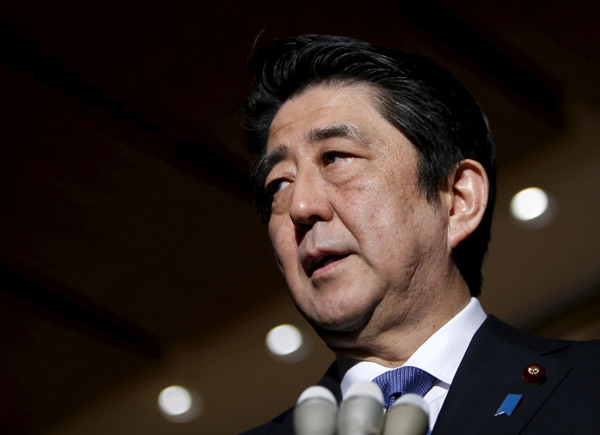 |
|
Japan's Prime Minister Shinzo Abe speaks to reporters at Abe's official residence in Tokyo, Japan, January 28, 2016. Japanese Prime Minister Shinzo Abe said on Thursday he wants the new economy minister, Nobuteru Ishihara, to continue the government's efforts to push through structural reforms. [Photo/Agencies] |
Together with the United States and Australia, Japan has again tried to drive a wedge between Southeast Asian countries and China. Although the three countries have no territorial claims in the South China Sea, they are intervening in the region in the name of "freedom of navigation" and "the rule of law".
When, after their meeting in Laos last week, the foreign ministers of the Association of Southeast Asian Nations did not mention in their final statement the ruling in the South China Sea arbitration case initiated by the Philippines, the three countries came up with their own statement chiding China for its claims in the South China Sea.
Japan, the US and Australia regard themselves as a "pillar" of stability throughout the Asia-Pacific region, and the foreign ministers of the three countries met on the sidelines of the ASEAN meetings, issuing a statement in which they called on countries in the region to uphold the ruling, which China has consistently said it does not acknowledge or accept as it is unlawful.
For Japan and its allies, China is inherently in the wrong simply by growing stronger. Any move by China is seen as a challenge to their power, or the existing status quo, which allows no room for newcomers.
Even China's vision of interconnecting continents with its Belt and Road Initiative has been deemed as a means for Beijing to take the initiative in defining regional policy, considered by the three as the continental power's strategy for consolidating a sphere of influence in the Asia-Pacific area.
Japan on the other hand is implementing a strategy that aims at supplementing the aid it provides the region, its traditional tool of influence, with new military cooperation and assistance.
Southeast Asia now tops the foreign policy agenda of Japanese Prime Minister Shinzo Abe's administration.
Abe visited the 10 ASEAN countries in the first year of his return to power, highlighting a new appraisal of the region in Japan's strategic calculations.
In Laos, US Secretary of State John Kerry said he supported the resumption of talks between China and the Philippines over the South China Sea.
But Japan has not uttered a single word encouraging peaceful resolutions to the disputes through negotiations, instead is seeking to stoke tensions in the region. Japan has sought to strengthen its partnership with Southeast Asian countries through capacity-building and defense cooperation.
Japan has enhanced its presence in the region by upping the number of patrols in the South China Sea, increasing its participation in bilateral and trilateral military exercises, and making more port visits to maritime countries in Southeast Asia.
Japan joined the US-Australian Talisman Sabre biennial military exercise for the first time in July 2015, a move that showed how Japan wanted to play a role in the Western Pacific.
Japan also conducted its first bilateral maritime and air exercises with the Philippines in 2015 and its first bilateral table-top exercise with Vietnam in February 2016. In April, a Japanese Maritime Self-Defense Forces destroyer participated in multilateral naval exercises hosted by Indonesia.
Among several ASEAN countries, Abe invited Laos, the grouping's rotating chairman for this year, to an outreach meeting when the world's seven most industrialized nations convened in Japan in late May. Japan intended to draw the Southeast Asian countries to its side, offering them aid and trade.
However, the latest meeting of ASEAN foreign ministers drove home the message that Japan's approach is not working.
The author is China Daily Tokyo bureau chief.
caihong@chinadaily.com.cn

It has been a while since I've contributed to this Forum and I figured that since now I am officially on summer holiday and another school year is behind me I would share a post with you.